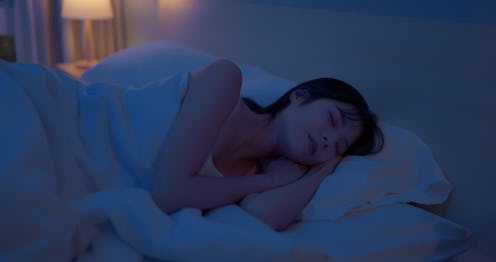Life
The One Thing You Need To Know About Clean Sleeping

You've probably heard about "clean sleeping," considering it was recently featured in Goop as one of Gwyneth Paltrow’s health commandments. And while there's a lot to know about it in order to do it correctly, I'm going to tell you the one thing you need to know about clean sleeping, because honestly, it's the most important thing worth repeating about the whole concept.
The concepts behind clean sleeping are nothing new. They range from going to bed early to getting a lot of sleep to meditating before bed. Despite the fact that it sounds very new age and suggests some kind of purist approach, it's just the basic stuff you already know. But there is one thing that's mentioned, that I think is worth highlighting: unplugging before bed.
I've always had trouble falling asleep. I typically spend up to a few hours each night playing around on my phone, finding more and more things to be concerned with or interested in before I realize it's much too late to be awake, and finally put my phone down. But even then, my mind is spinning. When I would close my eyes, I'd see patches of light like reminders of the screen. By the time I would realize how late it was, I wouldn't even feel tired anymore. All that time on my phone was waking me up, getting me engaged, stimulating my brain, and taking me in the exact opposite direction that I needed to head to.
It wasn't until I created some phone rules for myself that I started to find an easier time falling asleep. I never realized how much my pre-bed phone time was affecting my sleep, but it truly was. If you want to eliminate that cradle time with your phone in your face before bed, these are a few things you can start to do, to ease into it.
Do Not Disturb
Before you go to bed, put your phone on "Do Not Disturb" mode. That will inhibit your phone from waking you up for any reason. Texts and social media notifications will all arrive without a sound, and calls will be forwarded to voicemail. Though for safety, you might want to let the people you know who might call you for an emergency that you will be putting your phone in that mode and to call you on a landline, or wait until morning to get in touch with you.
Lights Out, Phone Away
When you turn the lights out, you tell your body you're getting ready for sleep. But then when you put your bright phone in your face, you tell your body that you're waking up. Don't make things confusing for yourself, just do your pre-bed phone time while the lights are still on, and once you turn the lights off, put your phone away.
Charge Away
If you're brave, plug your phone in to charge for the night on the opposite side of your room, or just out of arms' reach. This is great for two reasons: you won't have to be tempted to play with your phone if you wake up in the middle of the night, and when your alarm clock goes off in the morning, you'll have to get out of bed to turn it off, ensuring you actually wake up.
Use A Real Clock
If you only use your phone as a clock and alarm clock, keep it outside of your room at night and simply use an old school alarm clock. Go back to basics, and make things easier and less tempting for yourself. You don't need to have your phone in your room.